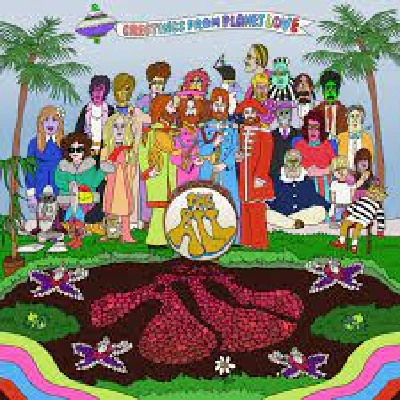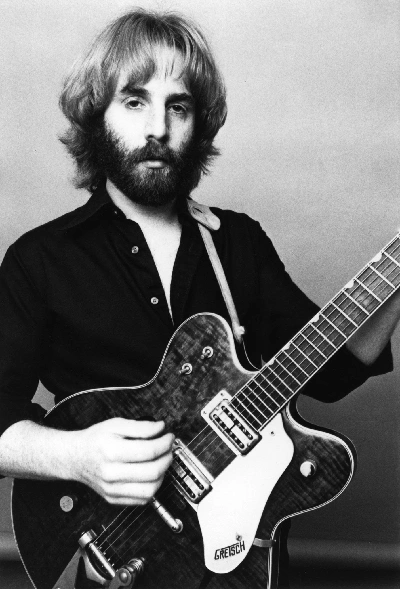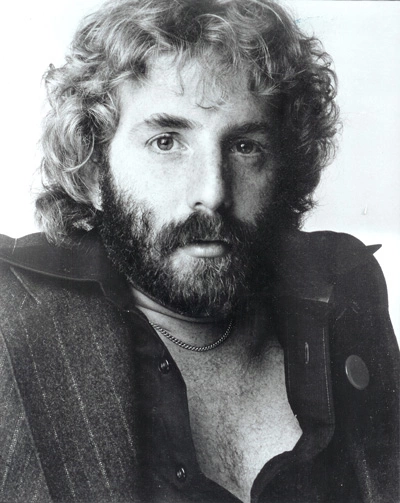Andrew Gold
-
The Fraternal Order Of The All - Greetings From Planet Love
published: 30 /
8 /
2023

Eoghan Lyng examines classic singer-songwriter Andrew Gold’s recently reissued 1997 psychedelic album, ‘The Fraternal Order Of The All - Greetings From Planet Love’,
Article
There are two possible ways in which to tackle a pop album, and both have their strong points. There's John Lennon's preferred method, which posits the strength of the album on its unvarnished truth, regardless of the truth in question (by the time he recorded ‘Double Fantasy’, it really was about his strolls in New York.) Paul McCartney, meanwhile, favours another method, which is to imagine he's another artist entirely, which might explain why two of his most interesting albums – ‘Thrillington’ and ‘The Fireman’ - were released under a nom de plume.
Considering his metier ('Never Let Her Go' is decidedly Wingsesque sounding in its resolve), it's no surprise that Andrew Gold veered more for the McCartney school of thought than the rawer form, which is why it shouldn't surprise fans of the Wax frontman that he released an album under the guise and philosophy of another person's vision. The finished result, ‘The Fraternal Order Of The All - Greetings From Planet Love’, was his tribute to psychedelic rock, fashioning a homage that was infinitely more respectful to the schlock-rock throwbacks Cast were issuing at the time (discerning readers might consider it a spiritual followup to Andy Partridge's work with The Dukes of Stratosphear, but personally I find that too grand a pigeonhole to cast on it.)
McCartney's shadow is most evident on 'Rainbow People', not least because it features a barrel-house piano undulating beneath the cascades of "la la las" that cements the work. 'Love Tonight' tips its hat back to The Beach Boys, particularly through its falsettos, every note pressed a la Carl Wilson in 1966. The album boasts a selection of tidy bass hooks, capturing the sound of the era. (On first listen, I assumed it was 10cc mainstay Graham Gouldman on bass, but the liner notes point out that Gold played the majority of instruments. Nevertheless, Gouldman is credited with harmony vocals.)
The album walks at a leisurely pace, with only song testing the arena of radio play at 5:45 minutes.The guitar heavy 'Groovy Party at Jimmy’s Magic Pad ' maintains a steady, surflike beat that's enjoyable - I won't comment on the women moaning in the backgruond. 'Mr Plastic Business Man', embellished by bouncy Ringo fills, is bolstered by a vocal that flits between Bob's Geldof and Dylan, while 'It Has Eyes But No Sight' , all horns and kazoos, could easily be mistaken as a Pink Floyd track from the Saucerful era.
Unlike Neil Innes' work with The Rutles, Gold's work holds no other agenda than to entertain. But for all the simulation, the album works best when Gold remembers his homeland, particularly on the jangly 'Space and Time', a song soaked in the inflections of his country. His rock voice, largely hidden for most of the album, comes out on 'Ride The Snake', capturing a sultriness that could have easily sat on an Arthur Lee album.
What was wonderful about Gold's songcraft was its universality. He was embarrassed when he was asked if 'Lonely Boy' reflected his upbringing: "Maybe it was a mistake to do that, but I simply put in those details because it was convenient. I hadn't been a lonely boy at all – I'd had a very happy childhood." His partnership with Gouldman - whether it was in 10cc or Wax - demonstrated an eagerness to veer into the cultural zeitgeist. And with ‘The Fraternal Order Of The All - Greetings From Planet Love’, Gold went one further, singing what he envisioned as an interesting alternative to the 1960s. What he created wasn't just clever, it was almost too good.
Track Listing:-
Band Links:-
https://www.andrewgold.com/
https://www.facebook.com/andrewgoldmus
https://twitter.com/search?q=andrewgol
https://en.wikipedia.org/wiki/Andrew_G
Play in YouTube:-
Picture Gallery:-

